“Sins of the Father”
Written by Drew Deighan and Ronald D. Moore & W. Reed Moran
Directed by Les Landau
Season 3, Episode 17
Production episode 40273-165
Original air date: March 19, 1990
Stardate: 43685.2
Captain’s Log: As part of the same officer exchange program that sent Riker to the Pagh a year earlier, Commander Kurn of the Klingon Defense Force transfers to temporarily take over as first officer, having requested the Enterprise specifically. He puts the crew through their paces—riding the crew pretty hard, from pulling a surprise inspection on engineering during a maintenance cycle to being generally patronizing toward Worf.
The final straw for the latter is during a dinner in the captain’s mess, where Kurn describes the food as too bland for the stomach of a Klingon, and when La Forge points out that it suits Worf just fine, he simply says, “Yes” with quite the sneer.
When Worf confronts Kurn in private, Kurn’s disdain is palpable, dismissive of Starfleet and the ship as being too geared toward comfort and being at ease, and Worf as being soft. Worf finally blows up at him (“I am Klingon! If you doubt it, a demonstration can be arranged!”), which is what Kurn has been waiting for.
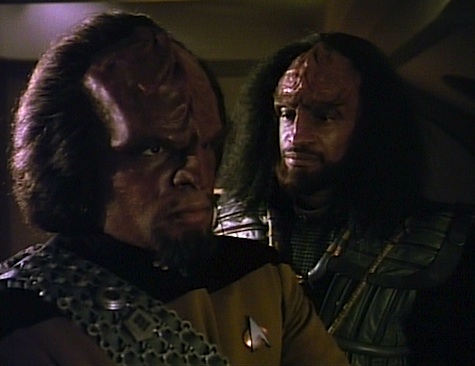
Kurn, it turns out, is Worf’s younger brother. When Worf’s parents left for Khitomer, Kurn was less than a year old, so he stayed with a family friend named Lorgh. After they were killed, Lorgh raised Kurn as his own, not telling him the truth until he reached the Age of Ascension.
Worf assumes that Kurn asked to be assigned to the Enterprise to watch Worf, and satisfy his curiosity about how much of a Klingon he still was after being raised by humans and serving in Starfleet. But Kurn’s reasons are far more complicated: as the elder brother it is up to Worf to challenge the High Council’s ruling that their father, Mogh, was a traitor to the empire.
The allegations—brought about by Duras, the son of Mogh’s rival Ja’rod—are that Mogh gave the Romulans the codes necessary to bring the shields down and destroy the Khitomer outpost, killing 4000 Klingons (including both Mogh and Ja’rod). Worf asks Picard to grant him leave to travel to challenge the ruling, but Picard refuses—instead diverting the Enterprise to the Klingon homeworld so that Worf’s captain can stand by his side as he faces his father’s accusers.
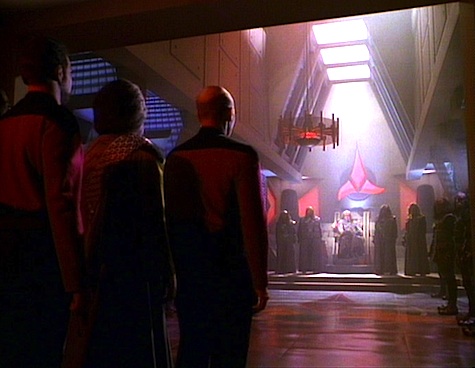
The catch, though, is that if Worf fails in his challenge, he will be executed as a traitor. Kurn asks to be Worf’s cha’DIch—his second—in order to defend him, since he will be denied combat during the proceedings. Worf accepts, but tells Kurn that he must identify himself as the son of Lorgh, this way if Worf fails, he will survive. Kurn insists that he be allowed to admit to being the son of Mogh, but Worf says, “On this ship, you are my commander and I obey. But in Council Chambers, you are my cha’DIch. You do not insist. You obey.”
They arrive at the Great Hall in the First City. Worf officially challenges the lies told about his father. Duras sneers even more than Kurn did earlier, going so far as to rip Worf’s baldric off and backhand him.
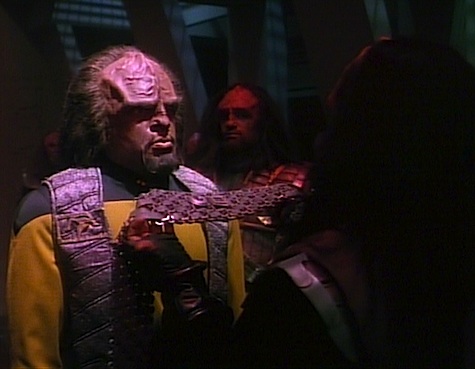
After the initial session, Chancellor K’mpec declares a recess before the meqba’, when the evidence will be presented. After the dismissal, K’mpec speaks to Worf alone, offering to let him leave before the meqba’, the challenge forgotten, with no consequences to him. Worf is aghast that K’mpec would ask him to dishonor himself so.
Meanwhile, Kurn is called to a rendezvous, which turns out to be with Duras—who knows that Kurn is also a son of Mogh. He offers Kurn a chance to back off, which Kurn naturally refuses. So Duras’s paid assassins stab him with a nasty blade.
Kurn is saved by Crusher back on the Enterprise, but Worf fears that Duras knowing his brother’s bloodlines will mean the end of his life anyhow.
Worf and Picard are both convinced that something bigger is going on here. Worf then asks Picard to be his new cha’DIch. At first, Picard is reluctant to accept, but Worf sucks up a bit, and the captain says yes.
Riker, Data, La Forge, and Crusher dig through both the evidence against Worf and the records of the U.S.S. Intrepid (the Starfleet ship that responded to Khitomer’s distress call), and they discover two things: one, the evidence was tampered with, as it doesn’t quite line up with the Intrepid‘s sensor logs; two, that there was another survivor: Worf’s nurse Kahlest.
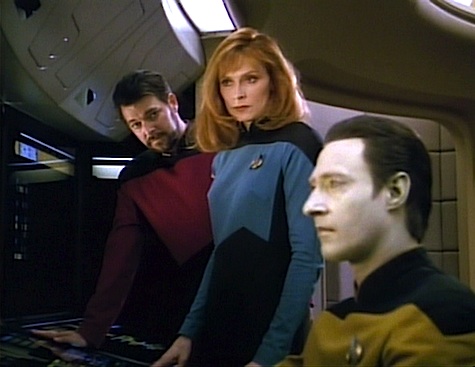
Picard finds Kahlest living in the old quarter. At first, the old woman refuses to help Picard, but then two assassins try to kill him. Picard kills one, and Kahlest kills the other. Picard then asks if the Council will recognize her; she says that K’mpec knew her back in the day. In the hopes that it might shake loose the truth, Picard brings her to the Great Hall.
The minute she enters the Great Hall, K’mpec summons her, Picard, Worf, and Duras into his office. Duras tries to get Kahlest to talk, but Picard insists she only speak in open Council. Duras says that she’ll die before she gets to give any evidence there.
K’mpec snarls at Duras, asking if he’ll now kill an old woman to cover his dishonor—and the other shoe drops. It was Duras’s father who was the traitor. A Klingon cruiser captured a Romulan vessel with logs that showed a Klingon signalled the Romulans, but the warriors on the cruiser didn’t know whose code it was—only the Council did. But the House of Duras is powerful and condemning Ja’rod would shatter the Council and plunge the empire into civil war. Since Worf was in the Federation, and they didn’t know Mogh’s other son was alive and well, it seemed safest to blame Mogh and hope nobody would notice.
Both Picard and Worf are pretty disgusted that an empire that claims to, as Picard puts it, “hold honor so dear” would condemn Worf (and Kurn) to death for political expediency. Picard refuses to turn either his chief of security or Kurn (still in his sickbay) over to the Council—a ballsy move, since it would sunder the Klingon-Federation alliance.
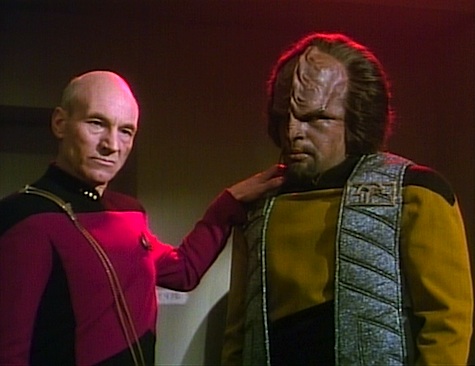
Worf then announces that he’s willing to die for the empire. When Picard objects, Worf—for the first and last time in his entire career—snaps at Picard: “The cha’DIch would be silent!” He asks only that Kurn be allowed his life. “Only you need know his true bloodlines,” he says with a sneer worthy of that of Duras and Kurn both.
Duras, in a hilarious bit of unintended irony, says that it’s unacceptable because Kurn’s honor would demand justice (like he’d know about that). Worf then offers something as good as his life: he accepts discommendation. He will be banished from the empire and deemed a traitor, and will do so in open Council.
Before they go out into the Great Hall again, however, Worf needs to do one last thing: he backhands Duras and declares him a traitor. Then he turns to an approving K’mpec and says, “Now I am ready.”
The entire Council crosses their wrists in front of their faces and turns their back on Worf one by one—including, reluctantly, Kurn. Worf’s brother was willing to die, but Picard tells him not to forget what Worf has done today. “Do not let your children forget.”
Afterward, Worf walks out of the Great Hall for what he believes to be the last time.
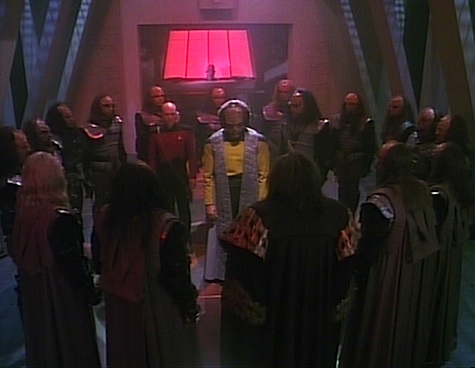
Thank You, Counselor Obvious: During the dinner in the captain’s mess, Kurn mentions that he had to restrain himself from killing Riker earlier, and Troi laughs, not realizing at first that he isn’t kidding.
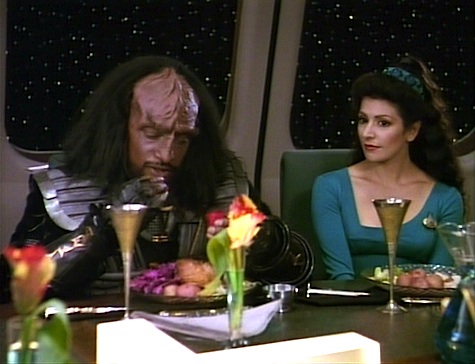
The Boy!?: Kurn lights into Wes from jump, and he later complains to Riker that he can’t seem to do a thing right in Kurn’s eyes.
There is No Honor in Being Pummeled: We learn Worf’s father’s name for the first time, and also discover that Worf has a brother, as well as a nurse. It was established in “Heart of Glory” that all Worf knew of being a Klingon was through study, not direct experience, and that conflict comes to a head here. Worf is, in many ways, an ideal Klingon, but ideals don’t always work in political reality. What the High Council no doubt all view as a day at the office is appalling to Worf, who cannot abide such behavior.
But in the end, he understands that he must act to preserve the empire, and so sacrifices his own honor and his standing among his people in order to do so.
No Sex, Please, We’re Starfleet: K’mpec had the hots for Kahlest back in the day, but she rejected him, deeming him to be too fat. When they meet again in the chancellor’s office, K’mpec declares that it’s good to see her again, and she just looks at him and says he’s still fat.
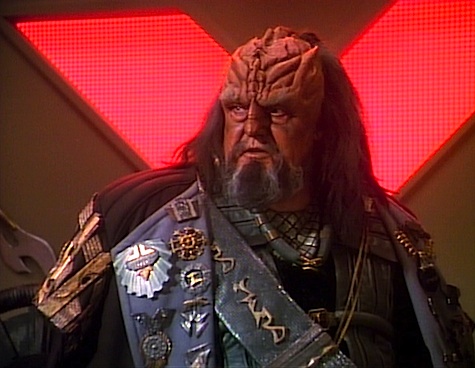
I Believe I Said That: “It is a good day to die, Duras, and the day is not yet over.”
Worf quoting Crazy Horse, and setting the tone for pretty much all future Klingon dialogue.
Welcome Aboard: Tony Todd makes the first of several magnificent appearances at Worf’s brother Kurn. He takes over the screen from the moment he beams on board, and for all that it’s Worf’s episode (and it totally is), Todd’s presence helps sell it.
The excellent Charles Cooper and Patrick Massett make the first of two appearances as K’mpec and Duras, with both coming back in “Reunion” in the fourth season. Cooper previously appeared as another gravelly voiced Klingon, General Koord (wearing a very similar cassock), in Star Trek V: The Final Frontier. Thelma Lee is effective as Kahlest, initially haunted and hiding in her hovel, coming out of her shell in response to Picard’s bravery against the assassins.
Trivial Matters: This episode starts the first real major story arc in Star Trek TV history, as the Klingon politics introduced in this episode continue to recur throughout both TNG and Deep Space Nine, finally coming to a head in the DS9 episode “Tacking Into the Wind,” also written by Moore.
We get our first view of the Klingon homeworld in this episode, the design of which won an Art Direction Emmy for production designer Richard James. The world would be dubbed Qo’noS in Star Trek VI: The Undiscovered Country. It’s also the first formal establishment of the Klingon governmental structure: a High Council administrates, led by a chancellor (though that title would also not be established until Star Trek VI).
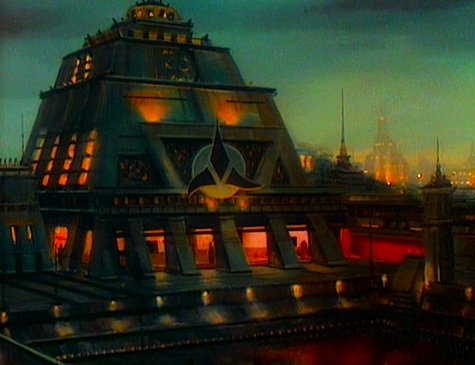
Kahlest says that Mogh was “loyal to the emperor,” even though no emperor is seen in this story, and “Rightful Heir” would later establish that there has been no Klingon emperor for centuries.
This episode also provides more details of the Khitomer massacre that claimed Worf’s parents: Romulan ships got the access codes to the outpost so they could lower the shields and destroy the place. A Klingon gave the Romulans those codes, revealed in this episode to be Ja’rod, Duras’s father. The family’s proclivity for working with the Romulans will be seen again in “Reunion” and “Redemption.” It’s also established that the Intrepid was the ship that rescued Worf, and is implied to be the ship on which Worf’s human foster father served—that will be more formally established in “Family” when we meet retired Chief Petty Officer Sergey Rozhenko.
Using details established in this and other episodes, your humble rewatcher dramatized the Khitomer massacre in full in his Lost Era novel The Art of the Impossible, including the build-up, how the Council didn’t know that Kurn didn’t take the trip, why Worf didn’t remember that he had a brother nor that his nurse survived, why Kahlest kept her survival a secret, and how Chief Rozhenko came to take him into his home. Lorgh is also established in that novel as an agent of Klingon Imperial Intelligence, and he appears in several novels after that (among them Warpath and A Time to Kill by David Mack, my own A Burning House, and possibly in an upcoming novel by David R. George III).
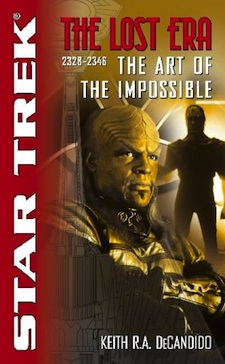 The House of Duras will continue to be antagonists through this and two more series: Duras will return in “Reunion”; his sisters Lursa and B’Etor become recurring villains in “Redemption,” “Firstborn,” DS9‘s “Past Prologue,” and Star Trek Generations; and an ancestor also named Duras shows up to cause trouble for Jonathan Archer in Enterprise‘s “Judgment,” “Bounty,” and “The Expanse.”
The House of Duras will continue to be antagonists through this and two more series: Duras will return in “Reunion”; his sisters Lursa and B’Etor become recurring villains in “Redemption,” “Firstborn,” DS9‘s “Past Prologue,” and Star Trek Generations; and an ancestor also named Duras shows up to cause trouble for Jonathan Archer in Enterprise‘s “Judgment,” “Bounty,” and “The Expanse.”
It’s easy to forget, given that it’s pretty much abandoned after Act 1, but we also get to see the officer exchange program from “A Matter of Honor” make a triumphant return. It becomes very quickly apparent that Riker handles Klingon food a lot better than Kurn handles human food (which is kind of funny, now that I think about it…). The program will be seen again in “The Drumhead.”
Make it So: “Execute!” All by itself, this is a truly fine episode, a grand political epic filled with intrigue, secrets, double crosses, action, and noble sacrifices. Even though the Klingons have been a major part of Star Trek since their introduction in “Errand of Mercy” (half a dozen episodes of the original series, a couple of episodes of TNG, plus four of the five movies that had been released to this point), this was the first time we saw their homeworld and their government up close.
Looking back twenty years later, it’s even more amazing. The groundwork for so many episodes of both TNG and DS9 was laid in this episode.
And what an episode it is for Worf. The introduction of the long-lost younger brother could be the worst of all clichés, but it’s totally sold on the skills of both Tony Todd as that brother and Michael Dorn in one of his best performances to date. The character goes through so much here and—just as in “The Emissary“—he comes through in the end with a last-minute brainstorm that solves the problem, though this time it’s one that comes at a deep personal price.
Sir Patrick Stewart also gets to shine, as Worf asks the little bald human to be his cha’DIch, and damn if he doesn’t live up to the role and more so, without ever once losing his authority or gravitas, even as he kicks assassin ass outside Kahlest’s home.
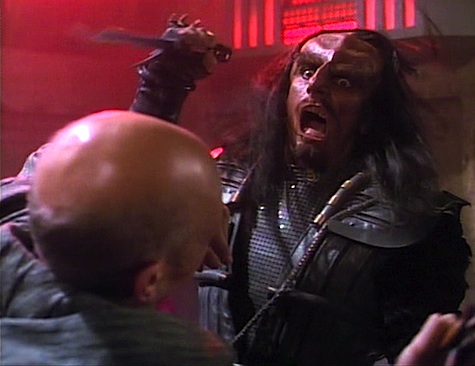
What holds the episode back a bit are a bunch of minor nits. The script feels sloppy in spots—”the Klingon Imperial Empire” from the Department of Multiple Redundancies Department; Worf calling the assassin’s weapon used on Kurn “ceremonial,” which is an adjective to describe weapons that aren’t actually used; going straight from Wes and La Forge telling Riker that Worf is the only one Kurn isn’t harassing to a scene of Worf being harassed by Kurn. We waste an entire act with the Enterprise crew being bullied by Kurn, which are scenes that actually work well on their own, but in retrospect feel like they wandered in from a different episode. It might have been fun to do “A Matter of Honor” in reverse and really seen how Kurn adjusted to Starfleet, but it was abandoned once the A-plot kicked in.
And director Landau, normally one of the more reliable of TNG‘s stable, makes a lot of odd choices. He darkens the transporter room so Kurn can be in shadow, and does other silly lighting tricks, like the bright light on Worf when he’s in Council chambers. There are some odd camera angles, looking up at people (in an episode already filled with ridiculously tall folks like Dorn, Todd, Massett, and Cooper), with the worst offender being Worf’s opening statement, where the camera’s angled right up Michael Dorn’s nose.
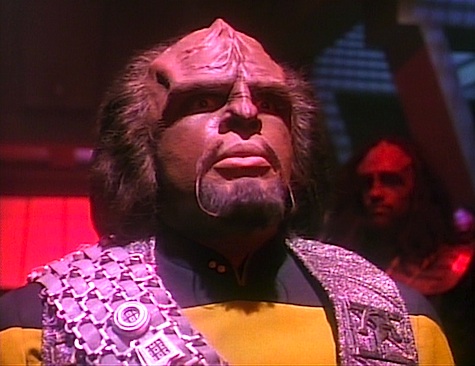
Also, the consequences to Worf’s sacrifice are pretty big on paper, but they come without significantly affecting the status quo. I mean, yes, he’s accepted permanent exile from his homeland, but it’s a place he’s spent almost no time in anyhow.
Finally, there’s just too damned much shouting. I mean, really, I know Klingons are bombastic, but it just gets ridiculous after a while.
Still, a great episode that just sets up more greatness.
Warp factor rating: 8
Keith R.A. DeCandido is particularly proud of The Art of the Impossible and thinks you should all go out and buy it right now this minute. Go to his web site for links to his blog, his Facebook page, his Twitter feed, not to mention ways in which you can buy some other of his books that he’s proud of, like the fantastical police procedurals SCPD: The Case of the Claw and Unicorn Precinct.










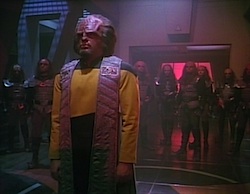
Kurn is Candyman! (well, Tony Todd played both.)
I knew he looked familiar, but I only just now recognized him.
Nobody else sounds like Tony Todd.
I remember this episode because of the sets and paintings. The family TV had just died and been replaced by a new one – twenty seven whole inches! The episode was so darned visual, it was really great fun to watch.
Tony Todd later did a great job as an older Jake Sisko, too.
…I’m still waiting for a good Klingon series. I think there’s potential there, and I’d have readily taken a good one over ENT.
Tony is one of my favorite Trek guest stars. While I love Kurn, my favorite role of his was as the adult Jake Sisco in the DS9 Episode The Visitor
(which is my 3rd favorite Trek episode overall after The Inner Light and Chains of Command pt II)
Keith, you say in this re-watch both that a few tiny things hold the episode back from being great and that it is great. Well, which is it? :-)
Personally, I’ve always thought it was brilliant. I had forgotten Tony Todd played Kurn; he has been excellent in everything I’ve seen him in.
— Michael A. Burstein
I’m curious about Worf accepting the discommendation…at the end of the episode, it makes it seem as though he’s accepted the rejection of his homeworld and his people, and is content to be an outsider within Starfleet and on the Enterprise, but then the rest of the series Worf is struggling with that choice and ultimately ends up being ‘forgiven’ and having his father’s name (and house) restored. It’s almost as if Moore gave us a brief pocket into the Klingon world and tied up some loose ends, and everyone in the writing room said “Great episode!”, but sometime during the next season someone else said, “Well, but wait…would Worf be cool with this?” This is me just nitpicking, of course.
Fantastic episode. I love the soundtrack, and despite some of the odd lighting, I loved the lighting and artwork and costumes…everything about this episode is great. It makes me look forward to the barroom scene that opens Season 5.
Maybe kurn called ahead for a more dramatic entrance when they beamed him aboard?
I too thought some of the camera angles were odd but overall i love this episode. Cant wait for Reunion!
“The world would be dubbed Qo’noS in Star Trek VI: The Undiscovered Country.”
Well, technically it was dubbed Kronos in TUC, and then Marc Okrand retconned the name to Qo’noS in his supplement to The Klingon Dictionary, and the latter was the one that caught on subsequently.
On the subject of this episode’s glitches, the one that stands out for me is that the first time the term “discommendation” (a rare but legitimate word) is used in Trek canon, Michael Dorn mispronounces it as “discommodation.” And that incorrect form of the word showed up in several subsequent Trek novels and comics as a result of Dorn’s error. Dorn’s gone on to become such an accomplished voice actor in the years since that it’s easy to forget his diction was poorer in early TNG.
@@@@@MnemonicNate: It’s one thing to decide to make a heroic sacrifice and plan to be stoic about it. It’s another to actually follow through on that plan.
We’ll get there in a few weeks, but, @scavenger and @MnemonicNate, I’m pretty sure that discovering that he has a son who also would be rendered an exile by that decision is what changes the equation for Worf…
Jeff..Good point. I’d forgotten about Alexander….but who here can’t claim to try for that as well?
To be fair about the “ceremonial” thing… it really depends on the culture and the ceremony. As my specific sort of pagan, I have a ceremonial knife and it is quite definitely used, I just don’t cut my steak with it. It’s special.
And then, when you get into translation problems AND Worf only really having a (probably English/Federation) book understanding of Klingeon culture… I’m just saying, it’s an easily explanable word choice.
At the time I figured that the Klingons would be likely to have ceremonial knives which were used only for ritualistic omerta assassinations. When jobs were done, the blades were probably always sent back to the head of the assassin’s family on a cloth that had been marked in runes of blood. If the assassination had been a failure, then the intended victim would send the knife back with a different set of runes, and the knife would be destroyed. Being the modern Klingon empire, the practice would have been outlawed a century or so ago, but it wouldn’t mean the knives weren’t kept hidden in old trunks. Made plenty of sense to me.
This is a great episode once it gets going, but what KRAD said about the first act being a bit of a waste is certainly true. It’s too bad, because there’s certainly no need to kill time with this kind of material.
Ron Moore’s Klingon stories were a great addition to TNG. Worf was so different from the rest of the TNG crew, so it is sort of fitting that his episodes are so different as well — darker, more violent, not to mention serialized to a certain extent. You can feel that a different morality is in play in a Klingon episode. Later this season, it’s kind of a pleasant surprise when Picard punches a Ferengi instead of trying to talk to him (in “Captain’s Holiday”), but here Picard is stabbing a Klingon assassin to death and we don’t blink an eye. It goes well with Star Trek’s cultural relativism — right and wrong are cultural norms, not absolute.
Pendard: He’s stabbing a Klingon assassin to death in order to keep the Klingon assassin from stabbing him to death. It’s unassailably self-defense. :)
As for the first act, I actually rather like it, but it so totally doesn’t fit with the rest of the episode….
—Keith R.A. DeCandido
@scavenger: Good point! Riker complains about his apparent lack of ‘ambition’ in ‘Best of Both Worlds I,’ but how many times has he shied away from his own captain’s chair? If he was as career-minded as he says he is, he would’ve been gone in Season 1.
@jeff: That’s a good point, and something that I think might show more of the depth of Worf’s character, as I wonder how eager other Klingons would be to: 1) Accept discommendation, and 2) Change their mind on the basis of their child and fight against the backlash. Klingons don’t seem to change their minds very easily.
I can’t remember how many scripts Ron Moore had this far into Season 3…probably no more than 5? Interesting that he writes for both Romulans and Klingons so early on.
Nate: This was the fourth script to bear Moore’s name on the credits — the others being “The Bonding,” “The Defector,” and “Yesterday’s Enterprise.” (In the case of “YE,” he was one of six credited writers…..)
—Keith R.A. DeCandido
Thanks, krad! Great reviews, as usual!
A brilliant episode, even if the first ten minutes could be excised without losing much.
Re: the name of the Klingon homeworld, I seem to recall a line in the season 1 episode ‘Heart Of Glory’ in which one of the rescued Klingons talks of ‘the traitors of Kling’. I for one am very happy that this got retconned to a district on the Klingon homeworld in the Star Trek Encyclopedia, because as a name for the planet, it is, as they say down our way, rwtsh.
One more thing: Tony Todd rules!
I think it’s a pretty interesting that Worf, who is a very by the book (in an almost literal sense) is okay with knowing that he is right and that the truth is revealed if only to be covered up again for the benefit of his people. It’s a very self-sacrificing notion and sort of in line with the Vulcan creed of the good of the many outweighing the good of the one. It’s as if his personal sense of honor is satisfied with having said what he needs to say (and backhanding someone) and that is enough.
I always like the begining and felt it belonged for a few reasons.
1) It gets Kurn on the Enterprise easily, with a continuity nod to A Matter of Honor
2) It gives us some nice, and well done, Trek humor in an episode which would have been very dark instead of mostly dark without it, and;
3) When Kurn (and my God, Tony Todd is so great in all his Trek roles!) reveals to Worf who he really it, seeing his interaction with the crew, it has a little more, to me, punch.
I always took the begining to be Kurn sizing Worf up, and also allowing us to see things about the crew (man, this episode and Chains of Command show what whiny bitches the Enterprise crew can be if they are pushed out of their comfort zone even a little) from the outside.
I mean, withouot that begining we wouldn’t have the line that always makes me laugh out loud, “None taken. I never kill anyone at the supper table, Mr. La Forge.”
That is filled with awesome sauce!
I agree with Gettysburg – the beginning has a different tone from what follows, but it sets up the episode and I too thought it was important to show Kurn’s thought process in needing to test his brother for his own satistfaction, to be sure he was worthy of representing the family at the challenge. This marks 3 strong episodes in a row, highlighting different main characters. The common thread in all of them is that Picard is the man. He’s principled, thoughtful, honorable, and the softer he speaks when he’s challenged, the more menacing he sounds. To me, the best-delivered line isn’t Worf’s “good day to die”, it’s Picard glowering at the Klingon who questions his courage, to which he says “you may test that theory. At your convenience.”. Pure bald bad-assery.
Good review, but I don’t get the nitpick about how Kern is treating Worf. Geordie and Wes say that the only person Kern isn’t cracking the whip on is Worf…and we cut to see that Kern, while cracking the whip on everyone else, is praising Worf and treating him with kid gloves. So, yes, he’s harassing him, but that was kind of G&W’s point–Kern’s being a jerk to everyone, by being tough on everyone except the one guy who wants him to.
Tony Todd rules.
Great episode! On a separate note, I met Tony Todd at a convention and he is an amazingly nice guy. His height was a little intimidating, but he was pretty much a big teddy bear. :P
Not what I was expecting to say the least.
The “Klingon Imperial Empire” was so ridiculous! But this is a grteat episode, and the groundwork it sets for future things is essential.
I always thought Sins of the Father was two separate plot ideas the writers threw around in a session and then decided to combine them. Kurn riding the crew could have been an episode all by itself (except the reversal was already done in A Matter of Honor) so that may explain why it’s a disjointed but still brilliant episode.
When Riker asks which Federation vessel was closest to Khitomer why doesn’t Data reply that it was the Enterprise-C?
The Intrepid survived to file a report, that is probably why it is on record as the nearest ship, the Ent-C did not survive so is probably listed under “ships destroyed near” in a different file since there are no actual reports or records from it. Never underestimate the ability of a computer give an accurate but totally misleading answer. It all depends on who set up the filing system and how the request is inputted.
@27: Didn’t the Enterprise-C respond to a completely different Romulan attack (the attack on Narenda III rather than the attack on Khitomer)? There’s no reason to believe the Ent-C was anywhere near Khitomer when it was attacked.
fronzel: because the Enterprise-C had been destroyed for a couple years at this point. Captain Garrett’s ship was lost at Narendra III, not Khitomer. If you want a detailed look at the chain of events that led to both attacks, check out the novels Vulcan’s Heart by Josepha Sherman & Susan Shwartz and my own The Art of the Impossible.
—-Keith R.A. DeCandido
@29, 30: Ah, yes, I had confused these two similar incidents. Thanks for straightening that out.
>”Kurn mentions that he had to restrain himself from killing Riker earlier, and Troi laughs, not realizing at first that he isn’t kidding.”
And perhaps thinking “I know the feeling”.
I agree with your criticisms about some of the writing and directing. That “Imperial Empire” thing made me laugh. I thought the ending was kind of weird. Picard could have recorded everything that was said in the “confession” at the end and projected it somehow into the main room (which is simultaneously a missed opportunity, arguably, on Picard’s part but also an huge oversight on the part of K’mpec who just happily blurted out all this incriminating stuff in a world where everyone seems to carry around little recording devices on their chests and conversations can be picked up on from orbit, if I’m not mistaken).
On top of that, it seems odd to say “You can die in dishonour… or live in dishonour!” I mean, I get the old “Planet of Hats” trope that Klingons don’t mind dying as long as it’s in a cool way and the old saying that there are fates worse than death. Yet this would be a very dishonourable death compared to dishonour but at least still being alive. Worf is banished from the Klingon Imperial Empire of Imperiousness but (a) death would banish him from it too and (b) Worf has lived amongst humans all his life anyway. It was also funny how no one mentioned it until the very end. It was all about “We win or we die” but it was more like “We live or we die… unless we choose to live… and then we live”.
And I have to strongly disagree about the actor that played Worf’s brother. His line delivery was absolutely awful, sub-amateur. Yeah he’s tall and he strode around a room of smaller people sitting in chairs. That will make someone seem like an alpha male, but that’s about it. His acting was bad and his delivery was shocking.
I enjoyed it overall yet it felt mostly pointless in the sense that the end result was that (a) Worf was dishonoured in the Empire yet we’ve seen every Klingon he’s met openly mock and dishonour him so far anyway (b) Worf is banned from going to a place he never goes to (c) his dad is thought of as a traitor, whereas before he was thought of as a traitor. I guess we can add (d) Worf has a brother, yet that one point shouldn’t really take 45 minutes to convey. I dunno, I guess more Worf is good and seeing some Klingon stuff is a nice change.
I didn’t like the introduction of Worf’s long-lost brother. I never like it when the characters’ backstories become more and more implausible during the course of a show because the writers feel the need to add surprise turns. Isn’t it enough that Data has a lost brother nobody knew about?
When I rewatched this together with my daughter, we both agreed that the best thing about the episode was Kahlest. “I caught his eye back then, but he was too fat.” Wonderful.
There is one nit that has always really bugged me about this episode, when K’mpek tells Worf and Picard that he won’t let the empire be pulled apart over one Klingon’s honor.
Isn’t that exactly what he is doing by letting Duras keep his honor by blaming Mogh instead?
RogerPavelle: No, they dumped it on Mogh in order to keep the peace, as K’mpec said, because Worf was in the Federation and probably wouldn’t even know about it. They didn’t know about Kurn. If Kurn hadn’t told Worf about it, it would’ve been taken care of quietly without fuss and the empire would roll merrily along. Worf and Kurn messed that all up by bringing about a public challenge.
—Keith R.A. DeCandido
It’s more that, after the challenge, he said that Worf (and Kurn) would need to die to protect Duras’ family honor.
RogerPavelle: Yes, because the challenge was public, so they had to publicly say that it was Mogh and execute Worf and Kurn for bringing about the challenge — that was to protect Duras and keep the Council from being sundered.
—Keith R.A. DeCandido
We know what Kurn is doing, but I’d assume perhaps Wes/LaForge don’t realize that in being so kind and solicitous to Worf, he’s actually harassing him. They likely think he’s just actually being nice, lol
One thing that I noticed. I thought Kurn’s parentage was a secret held only by Picard, Worf, K’mpec, Duras and maybe Kahlest too. Not the whole council. If so, it seems very risky for Worf to say “You must also… brother” when surrounded by the council. Or did they know?
@38
I think it is fair to say that the whole council knew by that point. The ship of state is the only ship which leaks from the top, as the saying goes. The council was committed to the lie about Duras and Mogh, so they are obviously fully on board with pretending not to know things they actually do know.
Tony Todd. What to say about him. I think he was born to play a Klingon. He doesn’t just knock it out of the park, he knocks it into the stratosphere!
As for Keith R.A. DeCandido’s comment about a “ceremonial” knife being used to stab Kurn, I kind of laughed out loud at that considering many Klingon ceremonies probably involve being stabbed, haha.
Is it just me or does everybody on the Enterprise D seem to have Daddy issues?
@krad, Make it So: Yeah, that line in the script of the “official” name of the Klingon Empire is silly. I wonder if Picard calls the Federation, the United Democratic Federation of Planets, haha.
@41 Troi has mummy as well as daddy issues, in fact despite her dead dad she seems to have very few hang ups about that.. Mind you, it is hard to imagine any issues with her dad that would not be eclipsed by Lxwana (spelling?). And Dr Crusher only ends up having [shudder]Grandmother issues in the awful rape ghost story.
@43/random22: For some reason, it’s usually the men who have daddy issues in American films and TV.
Oh dear. A full on in your face ButMyHonourPrecludesMe™ Worf story, with just another made up ceremony and a daft Klingon rule that if your father is adjudged a traitor, you can challenge a verdict but are executed it you fail to prove him innocent. What this says about Klingons is that they don’t really care that much about honour at all. All they care about is a good fight, an execution and it not really mattering if the traitor is a traitor or not as long as there is a bit of a bundle.
The huge honour deficit at the heart of Klingon society is proven even more acute when it’s revealed that the judge *knows* Worf’s father was innocent, but has decided to throw his family under the Space Bus because the accuser’s family are quite powerful. This level of corruption at the heart of Klingon society completely undermines them. It might work as an episode of Perry Mason, but if we’re supposed to buy into Worf’s sense of Klingon honour why does he carry on down that route now he has learned that the society he reveres is built on such corrupt foundations? What kind of idiot is he? The whole “I will take discommendation” for the honour of an honourless Empire? What a tw*t.
Also the convenience of the woman needed to prove Worf’s father was innocent just living in walking distance from the courthouse after thirty years so that Picard could just pop ‘round and pick her up stretches my credibility elastic to snapping point. This episode, I read, is held in very high regard by Trek critics and fans alike. All I can think is you’re very easily pleased and you don’t spend much time thinking about what you’re watching.
And while we’re at it, why does nearly every ButMyHonourPrecludesMe™ episode have to centre on Worf, a stupid new ceremony and some nonsense about matters of honour? Why not do a Troi-Klingon story? We had a good one on the Riker Exchange episode – but why not explore Worf’s experience with other cultures – why not show more of him unlearning to be a Klingon? It’s become such a handwave for a Worf character focussed episode. Like when Troi’s mum turns up, you know the episode is gonna be a wrong ‘un.
Poor old Michael Dorn – he’s worth more than this. A lot more.
4/10
Si Berian, here’s a thought experiment for you: what if we were talking about a Catholic whose child has been sexually assaulted by a priest, and the church covered it up and paid him off (as has happened repeatedly)?
“If we’re supposed to buy into Bill’s sense of devout Catholicism why does he carry on down that route now he has learned that the church he reveres is built on such corrupt foundations? What kind of idiot is he? The whole ‘I will take excommunication” for the honour of an honourless church? What a tw*t.”
“Sins of the Father” is the beginning of one of the few real story arcs of Rick Berman-era Star Trek, and one of the themes of it is the difference between the ideals of Klingon honor, as pioneered by Kahless thousands of years ago, and which Worf tries very hard to live up to (not having grown up in the empire and therefore not needing to deal with the compromises that reality brings to ideals), and the realities of a very corrupt empire. The roots of Worf’s devotion are seen particularly in “Birthright” and “Rightful Heir,” and the culmination of the empire’s corruption is seen in “Tacking Into the Wind.”
—Keith R.A. DeCandido
Obviously, androids aren’t the only ones unable to use contractions!!
This seems a good opportunity to ask about something that has bugged me for a while.
Is “Qo’noS” the official spelling of the Klingon home world? Because that is about ten times sillier than any Imperial Empire. As I understand it, the Klingon language has its own characters, so the English version should be a sensible transcription of how it is pronounced. Is there any justification for the extra apostrophe and capital S?
There are two ways to transliterate Klingon into English. There’s the basic English one, which spells the homeworld “Kronos.” Then there’s the tlhIngan Hol one, which would spell it “Qo’noS.” The specifics of the spellings can be found in The Klingon Dictionary by linguist Marc Okrand, who developed the language for The Search for Spock.
—Keith R.A. DeCandido
Thanks. If “Kronos” is acceptable, I’ll use that one, at least until I get my hands on a Klingon dictionary.
Fresnel,
transliterating any language into another is a difficult exercise fraught with pitfalls and unintended errors. Different languages use different phonemes and morphemes. When transliterating you are often taking a sound used into that other language and attempting find a character in the target language to represent it.
When I took Japanese nearly forty years ago we learned both the Japanese syllabary and one of the extant transliterations using English characters (there is more than one.) I quickly learned to prefer the syllabary. I always had trouble reading Japanese in English characters.
A lot of this, of course, is because our native language is ingrained in us. It is difficult to pronounce a character differently. In Japanese the most obvious example are the syllables ra, re, re, ro, and ru. To a native English speaker the tendency is to pronounce these as syllable beginning with r as in rabbit. But that wouldn’t be correct, because these syllables don’t represent a r sound.
Another transliteration system would render them as la, le, li, lo, and lu and pronounce them as l’s. But that isn’t right either.
Conlanging (the art of creating a made-up language) is difficult. I know. I’ve try to do it with my writing. An expert at it, like Mark Okrand, Mark Rosenfelder, or David Peterson can create wonders.
Sins of the Father must have been an eye-opening experience for Worf. It’s the first time he’s really been confronted with the truth about his people, how they are not all a race of honourable warriors as he has always ascribed to. Worf’s dealings with the High Council (and his future dealings with Gowron and the Duras family) will continue to sully his perceptions of Klingons in the years to come.
Following on from the discussion in 45 and 46, I thought it was great to have an episode showing that Klingon society would actually require a great deal of pragmatism and hypocrisy. That tends to be true of most real societies, but, just like the Vulcans of TOS, ideal Klingon values as portrayed are both ridiculous and inherently dysfunctional; a state, or even a ship, couldn’t survive a week if the leadership paid the their pretended values more than lip service. Yes, it’s corrupt, but play stupid games get stupid prizes.
a lovely episode. would have deserved a second episode to close the story of the officer exchange program.
The handling of the Klingons in Star Trek has aged dramatically well since it actually managed to predate Game of Thrones as a deconstruction of Medieval romanticization. Much has been made of fantasy knights and samurai in both of the East and the West, particularly in fiction predating the Nineties but dating back centuries before.
Much of Game of Thrones (or a A Song of Ice and Fire if you want) is a deconstruction of the idea of Medieval nobility and honor codes. As the Hound says, a knight is a trained professional killer first and foremost. Everything else is secondary and knights very often are observed in ignoring their oaths and “proper behavior” with the nature of land-owner nobility to be constantly feuding or jockeying for power.
Much is made of Worf’s unusually honorable nature of being a Klingon and he’s pretty much the Ned Stark or Jon Snow character running smack into the realities of courtly life. He’s not WRONG about Klingon honor (though even he occasionally runs into stumbling blocks that he prefers to ignore like “Victory is the most honorable thing a soldier can achieve.”) but almost no Klingon ascribes the same level of importance to it as he does.
He’s basically a very strict fundamentalist Khalessian (and even most of the fundamentalists I know tend to have hypocrisies they don’t acknowledge).
I’ve always loved the tragic irony of this episode’s ending, that the most honorable Klingon in that room is the one they’re turning their backs on. The staging and Dorn’s performance are perfect. Season 2 had already started to show Dorn’s capabilities as an actor, but its episodes like this that really drive it home. I don’t think there’s ever been as strong a group of consecutive episodes in Trek history as ‘Yesterday’s Enterprise’ to this one. Three weeks in a row where TNG just knocked it out of the park.
What an amazing episode! It’s like a whole season in 45 minutes. I think the two tonally different parts of the episode work well because of that. It could be a two parter, Kurn on the Enterprise, Worf’s trial to defend the family honor. Squeezing them together serves to increase the momentum of the story. If the trial had been the entire episode, it would likely have been a fairly good procedural. Instead the shock of Kurn’s lineage at the end of the act makes the show take a sudden right turn — off the ship (at what had to have been a bit of a budget buster).
The Democratic People’s Republic of Korea has no issue with the Klingon Imperial Empire. Sorry, we don’t have an emperor anymore, but we’ll double up on the name to feel better about it. My ceremonial challah knife is ceremonial, but I use it to cut my challah on shabbat & holidays. ;-)
I agree about some of the weird lighting choices and angles. Ever since Praxis blew up, we had to turn the lights down.
@57/doctoroctothorpe “It’s like a whole season in 45 minutes.” well, modern Trek seems to regularly stretch the story of a single or at best a double episode over an entire season. Best example for that being Picard, Season 2…
RIP Tony Todd. Magnificent character actor.